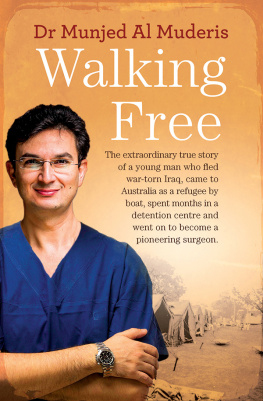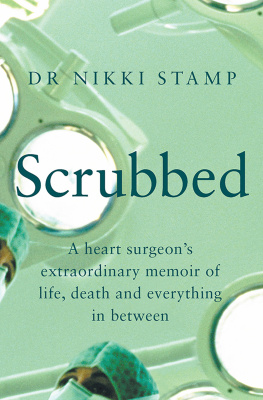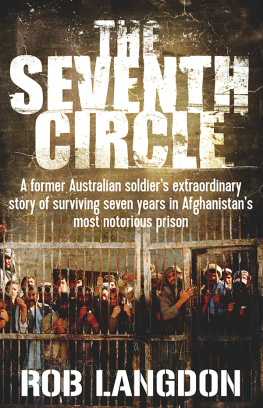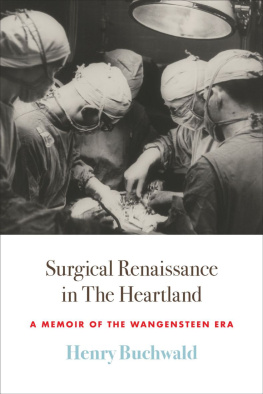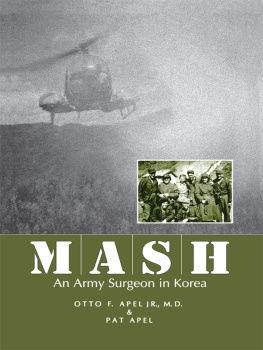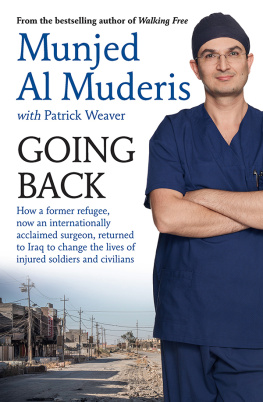
ASSOCIATE PROFESSOR MUNJED AL MUDERIS
Munjed Al Muderis is a world leading osseointegration surgeon and Adjunct Clinical Associate Professor at the University of Notre Dame Australia in Sydney. He practises as an orthopaedic surgeon at the Norwest Private Hospital, the Seventh Day Adventist Hospital and the Macquarie University Hospital in Sydneys northern suburbs.
He lives in Sydney with his wife Irina, whos a GP, and their daughter Sophia.
PATRICK WEAVER
Patrick Weaver is a highly regarded writer and public relations consultant who runs his own public relations and creative writing business in Sydney. He was previously a senior executive with an international public relations firm and with the Australian Broadcasting Corporation.
Patrick is a former journalist with extensive experience in radio and newspapers in Australia, New Zealand and the United Kingdom.
He was born in the UK, migrating to New Zealand in 1975 and to Australia in 1978. He lives in Sydney and has two adult children.
1
THE BEGINNING OF THE END
I was born by caesarian section at the Al-Haydari Private Hospital in Baghdad on 25 June 1972.
My mother was aged forty-two and my father sixty-five. They had met in Baghdad two years earlier at an exhibition of art by the children of the primary school where, at the time, my mother was the principal. Neither had been married before. My mother, Kamila Al-Turck, was born in Basra, in the south of Iraq, and was the third of ten children in a poor familyshe had five sisters and four brothers. As well as teaching, she had raised six of her younger siblings, assuming the role of parent and breadwinner after their mother and father both died young. Her two older sisters and one of her younger sisters had married and left the family home. The rest relied on her.
Shortly after meeting my father, my mother was demoted from principal to teacher at the school for refusing to join the Baath Party. She was forced to retire altogether when she married my father, because the Baathists were opposed to his political and professional affiliations. It was a strange decision; until the day she died, my mother was always a great admirer of Saddam Hussein. She just didnt want to join the party.
My fathers family was at the other end of the economic, social and political spectrum. He was from one of Iraqs traditional ruling families. Through him, I am descended from the Prophet Mohammed, and my grandfather was the head of the Sunni faith in large parts of Iraq and the Moslem world. The leadership of that section of the Sunni faith is handed down through the family, but neither my father nor his older brother would accept the role when my grandfather died. Instead, it was passed to a cousin. Also through my father, Im descended from the most traditional of Iraqi aristocracy, one of the nine families that originally ruled Baghdad.
My father, Abdul Razak Al Muderis, spent his whole life based in Baghdad. He was the second oldest of five childrenhe had an older brother and three younger sistersand was an intellectual, a lawyer who rose to become a judge. Over the years, he had established a wealthy lifestyle and extensive contacts among the intelligentsia and artistic elite.
His older brother Mahmood also reached high office; he held a number of ministerial portfolios but is probably better remembered for his literary talents. At the time, he was Iraqs most revered writer of short stories. He died in his forties of a liver complaint, but has been immortalised through statues of him in Egypt, where he spent his last days.
Another of my fathers siblings was also a high achiever. His youngest sister was the first female university lecturer in Iraq, teaching the Science of Human Society. As far as Im aware, its not a subject that is studied in Western countries, but it covers the development of society from nomadic and feudal roots to contemporary structures. Traditionally my family were high academic achievers, with many pursuing careers in law or medicine.
I was very close to my father and I admired him enormously. It was he who instilled in me the lifelong values of intellectual pursuit, study, hard work and dedication, as well as the merit of questioning conventional wisdom and charting your own course through life.
He was from another eraa dapper man who was very traditional in appearance, in a colonial kind of way. He always wore a suit, collared shirt and tie. I never once saw him casually dressed or in Arabic clothing.
He had the wisdom of a man whod experienced a life in search of knowledge and understanding. And, as much as his appearance was very traditional, his thinking was extremely radical and independent.
Because of his age, he had finished working by the time I was growing up. Instead, he would spend his days reading. His scholarly pursuit covered almost every academic area you can think ofscience, history, politics, philosophy, literature. Most evenings he would be driven to a prestigious club in the city where he would play chess with Iraqs most accomplished intellectuals and artists, discussing anything and everything.
There was only one person I can remember him refusing to discuss things withan uncle on my mothers side who had lived in Saudi Arabia and the United States, but in more recent times had become extremely religious, to the point of fanaticism. He would often attempt to talk to my fatherwho had a degree in religion and had memorised large parts of The Koran before becoming an agnosticabout the Islamic faith. My father would never take the bait.
I really dont remember anything. You know more than me, he would say.
I asked my father why he wouldnt discuss religion with this uncle. My father told me: His views are upside down. Hes already made up his mind. You cant educate someone who has such extreme views. Hes been brainwashed and is far too passionate.
My father always emphasised the power of logic and went to great lengths to drum the same rational approach into me. He insisted that decisions you make that are based on logic are usually right. He applied the philosophy across all facets of life, but especially religion.
I remember him telling me: If you think your action will cause damage to anyone or anything, you shouldnt do it, regardless of what The Koran says.
And he openly questioned many of the fundamental teachings of The Koran, like eating pork. He explained to me that this teaching made sense in the old days when refrigeration didnt exist and a person could become seriously ill if they ate pork that hadnt been correctly processed and stored, but with modern equipment, its not so logical now. Similarly, he believed that even though smoking was not specifically forbidden religiously, Its bad for you. So it makes sense not to do it.
I recall one day at primary school, we were told the story of god instructing Abraham to sacrifice his only son. Its the same story in The Bible and The Koran. As a kid, I was puzzled by the tale and asked my father about it.
He was very dismissive. Its stupid, he said. Can you imagine going to sleep, having a nightmare where god tells you to kill your son and you go ahead and do it? What makes you think this is an instruction from god rather than just a straightforward nightmare? The man must have been delusional or a psychopath!
No doubt it was his view of the world that led me to also become an agnostic.
As an example of how open-minded my father was, his best friend was the head of the synagogue in Baghdad. Not the most popular person in a state that is strongly against the existence of Israel!
Through that friendship in particular, my father developed a close interest in the conflict between Israel and Palestine. He blamed the turn of events largely on the British colonialists. Everywhere the British went, they left disaster, he believed. In Palestine, for example, the various ethnic groups had lived in some kind of harmony until the British arrived. Now look at it! he would say with exasperation.
Next page
